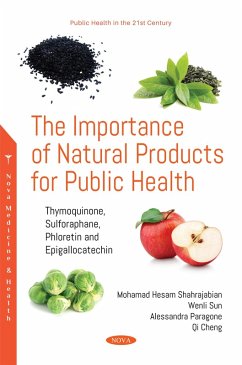Thymoquinone has a wide a range of beneficial pharmacological properties, including antioxidant, anticancer, anti-inflammatory, hypoglycemic, neuro-, cardio-, nephro- and hepatoprotective activity, with tremendous immune-modulating properties. Thymoquinone demonstrates significant impact on the treatment of different cancer types, such as bladder cancer, bone cancer, breast cancer, colon cancer, lung cancer and prostate cancer. Sulforaphane can be found in a wide variety of cruciferous vegetables, including cabbage, Brussels sprouts, cauliflower, broccoli, Chinese broccoli, broccoli sprouts, broccoli rabe, kohlrabi, collards, mustard, turnip, kale and radish. The most important health benefit of sulforaphane is its effects again breast cancer, lung cancer cells, human liver cancer cells, gastric cancer cell lines, ovarian cancer, prostate cancer, pancreatic cancer, colon cell cancer, treatment of cancer cell senescence, anti-inflammatory properties, antineoplastic properties, the reduction of placental and endothelial oxidative stress, potential in mixed granulocyte asthma, treatment of various neurological disorders, protection again skeletal muscle disease, anti-allergic properties and effects against oxidative stress. Phloretin, a 7,8-dihydrochalcone flavonoid of plant origin, is usually present in the roots and leaves of apple, pear, kumquat, strawberry and vegetables. The most important health benefits of phloretin are antioxidant and anti-inflammatory activity and effects on cancer cells. Its antioxidant activity happens through scavenging of reactive oxygen species and reduction of lipid peroxidation, and its anti-inflammatory effects occur through decreasing the levels of cytokines, chemokines and adhesion molecules, decreasing the expression of COX-2 and inducible nitric oxide synthase, and suppressing NF-[kappa] transcription. Phloretin affects cancer cells via cytotoxic and apoptotic activity, and the activation of immune cells against tumors. Epigallocatechin gallate is a tea catechin. The most important pharmacological activities of epigallocatechin gallate are antineoplastic properties, HIV infection, hypertension and associated complications, type II diabetes mellitus, its usage as cardioprotective, hepatoprotective and nephroprotective, and its applications in Alzheimer's disease, Parkinson's disease, and osteoporosis. Its importance in cancer treatment is due to its natural origins, safety, and low cost, but the main problem is its low bioavailability with various major limitations in epigallocatechin gallate studies.
Dieser Download kann aus rechtlichen Gründen nur mit Rechnungsadresse in A, B, BG, CY, CZ, D, DK, EW, E, FIN, F, GR, HR, H, IRL, I, LT, L, LR, M, NL, PL, P, R, S, SLO, SK ausgeliefert werden.









